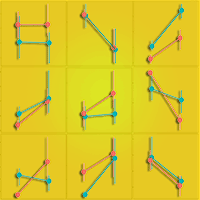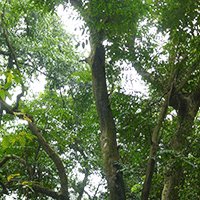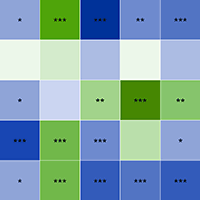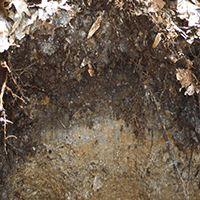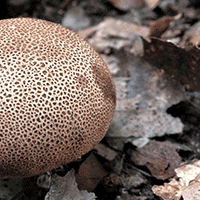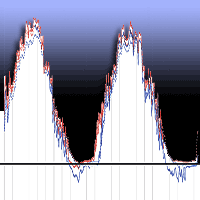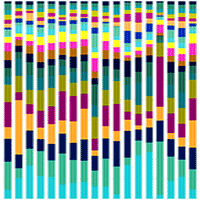With global nitrogen (N) deposition continuously increasing, few reports exist describing how soil bacteria respond at the molecular level to long-term addition of excess N in variously aged forests. To reveal the responses of soil bacteria to the elevated N, an experiment was conducted with a chronic nutrient addition within differently aged stands (46-, 78-, and 200-years-old) in the northern subtropical China since 2011, including three treatments, CK (no N nor phosphorus (P) additions), N treatment (N, 100 kg N ha-1), and N with P (N+P, 100 kg N ha-1 + 50 kg P ha-1) to examine potential P limitation under N deposition. Metagenomic sequencing was used to examine the snapshot responses of soil bacterial communities. Soil moisture and texture, ammonium, nitrate, SOC (soil organic carbon), TN (soil total nitrogen), TP (total phosphorus), DOC (dissolved organic carbon), DON (dissolved organic nitrogen) were measured to explain the influence mechanism of forest age and fertilization on changes of microbial community. Following N addition, soil bacterial community diversity and most dominant phyla increased, but they showed a decrease with increasing stand age. The effects of fertilization on the same taxa were variable across forest ages. Soil bacterial community responded differently in 7-year fertilization, with distinct shift in 46-year-old forest and adaptability to long-term N addition in the 200-year-old forest. Soil texture and moisture, DOC, DON, pH, SOC/TN and TP were significantly correlated with bacterial community across stand ages, while N fertilization affected the bacterial community mostly via inducing soil moisture, NO3--N, DOC and pH in the 46-year-old forest, whose effects decreased with increasing stand age. Our results suggest that due to the variation of soil physicochemical properties among forest ages, soil bacterial communities are more stable and resilient to N deposition with increasing the age of stands. Soil bacterial communities might not encounter P limitation following the long-term addition of N in the subtropics.
Keywords
, , , ,
Citation
Dai Y, Wang H, Chen M, Wang D, Cao X, Chu B, Xu X (2021). Response of soil bacterial communities to nitrogen and phosphorus additions in an age-sequence of subtropical forests. iForest 14: 71-79. - doi: 10.3832/ifor3655-013
Academic Editor
Maurizio Ventura
Paper history
Received: Sep 17, 2020
Accepted: Dec 10, 2020
First online: Feb 11, 2021
Publication Date: Feb 28, 2021
Publication Time: 2.10 months
© SISEF - The Italian Society of Silviculture and Forest Ecology 2021
Open Access
This article is distributed under the terms of the Creative Commons Attribution-Non Commercial 4.0 International (https://creativecommons.org/licenses/by-nc/4.0/), which permits unrestricted use, distribution, and reproduction in any medium, provided you give appropriate credit to the original author(s) and the source, provide a link to the Creative Commons license, and indicate if changes were made.

Breakdown by View Type
(Waiting for server response...)
Article Usage
Total Article Views: 37802
(from publication date up to now)
Breakdown by View Type
HTML Page Views: 31050
Abstract Page Views: 3396
PDF Downloads: 2741
Citation/Reference Downloads: 2
XML Downloads: 613
Web Metrics
Days since publication: 1817
Overall contacts: 37802
Avg. contacts per week: 145.63
Article Citations
Article citations are based on data periodically collected from the Clarivate Web of Science web site
(last update: Mar 2025)
Total number of cites (since 2021): 4
Average cites per year: 0.80
Publication Metrics
by Dimensions ©
Articles citing this article
List of the papers citing this article based on CrossRef Cited-by.
(1)
Bankevich A, Nurk S, Antipov D, Gurevich AA, Dvorkin M, Kulikov AS, Lesin VM, Nikolenko SI, Son P, Prjibelski AD, Pyshkin AV, Sirotkin AV, Vyahhi N, Tesler G, Alekseyev MA, Pevzner PA (2012)Spades: a new genome assembly algorithm and its applications to single-cell sequencing. Journal of Computational Biology 19: 455-477.
CrossRef |
Gscholar
(2)
Bobbink R, Hicks K, Galloway J, Spranger T, Alkemade R, Ashmore M, Bustamante M, Cinderby S, Davidson E, Dentener F, Emmett B, Erisman JW, Fenn M, Gilliam F, Nordin A, Pardo L, De Vries W (2010)Global assessment of nitrogen deposition effects on terrestrial plant diversity: a synthesis. Ecological Applications 20: 30-59.
CrossRef |
Gscholar
(3)
Chen C, Zhang JN, Lu M, Qin C, Chen YH, Yang L, Huang QW, Wang JC, Shen ZG, Shen QR (2016)Microbial communities of an arable soil treated for 8 years with organic and inorganic fertilizers. Biology and Fertility of Soils 52: 455-467.
CrossRef |
Gscholar
(4)
Chen K, Pachter L (2005)Bioinformatics for whole-genome shotgun sequencing of microbial communities. PLoS Computational Biology 1: 106-112.
CrossRef |
Gscholar
(5)
Cui J, Wang J, Xu J, Xu C, Xu X (2017)Changes in soil bacterial communities in an evergreen broad-leaved forest in east China following 4 years of nitrogen addition. Journal of Soils and Sediments 17: 2156-2164.
CrossRef |
Gscholar
(6)
Dai YZ, Wang HR, Li AQ, Zhu YY, Wang XP, Fang Z, Xu XN (2018)Dynamical pattern of soil microbial biomass and its response to nitrogen and phosphorus additions in a subtropical evergreen broad-leaved forest. Ecology and Environmental Sciences 27: 1395-1404. [in Chinese with English Abstract]
Gscholar
(7)
Elser JJ, Bracken MES, Cleland EE, Gruner DS, Harpole WS, Hillebrand H, Ngai JT, Seabloom EW, Shurin JB, Smith JE (2007)Global analysis of nitrogen and phosphorus limitation of primary producers in freshwater, marine and terrestrial ecosystems. Ecological Letters 10: 1135-1142.
CrossRef |
Gscholar
(8)
Esberg C, Toit B, Olsson R, Ilstedt U, Giesler R (2010)Microbial responses to P addition in six south African forest soils. Plant and Soil 329: 209-225.
CrossRef |
Gscholar
(9)
Frey SD, Ollinger S, Nadelhoffer K, Bowden R, Brzostek E, Burton A, Caldwell BA, Crow S, Goodale CL, Grandy AS, Finzi AC, Kramer MG, Lajtha K, LeMoine J, Martin M, McDowell WH, Minocha R, Sadowsky JJ, Templer PH, Wickings K (2014)Chronic nitrogen additions suppress decomposition and sequester soil carbon in temperate forests. Biogeochemistry 121: 305-316.
CrossRef |
Gscholar
(10)
Gravuer K, Eskelinen A, Winbourne JB, Harrison SP (2020)Vulnerability and resistance in the spatial heterogeneity of soil microbial communities under resource additions. Proceedings of the National Academy of Sciences USA 117: 7263-7270.
CrossRef |
Gscholar
(11)
Gurevich A, Saveliev V, Vyahhi N, Tesler G (2013)Quast: quality assessment tool for genome assemblies. Bioinformatics 29: 1072-1075.
CrossRef |
Gscholar
(12)
Han XG, Shen WJ, Zhang JB, Muller C (2018)Microbial adaptation to long-term N supply prevents large responses in N dynamics and N losses of a subtropical forest. Science of the Total Environment 626 (971): 1175-1187.
CrossRef |
Gscholar
(13)
Hardoim PR, van Overbeek LS, Berg G, Pirttilä AM, Compant S, Campisano A, Döring M, Sessitsch A (2015)The hidden world within plants: ecological and evolutionary considerations for defining functioning of microbial endophytes. Microbiology and Molecular Biology Reviews 79 (3): 293-320.
CrossRef |
Gscholar
(14)
Hunt N, Gilkes R (1992)Farm monitoring handbook - a practical down-to-earth manual for farmers and other land users. University of Western Australia, Nedlands, WA, and Land Management Society Como, WA, Australia, vol. 496, pp. 198-205.
Gscholar
(15)
Jangid K, Whitman WB, Condron LM, Turner BL, Williams MA (2013)Soil bacterial community succession during long-term ecosystem development. Molecular Ecology 22: 3415-3424.
CrossRef |
Gscholar
(16)
Kanehisa M, Goto S (2000)KEGG: Kyoto encyclopedia of genes and genomes. Nucleic Acids Research 28: 27-30.
CrossRef |
Gscholar
(17)
Kaspari M, Bujan J, Weiser MD, Ning D, Michaletz ST, He Z, Enquist BJ, Waide RB, Zhou J, Turner BL, Wright SJ (2017)Biogeochemistry drives diversity in the prokaryotes, fungi, and invertebrates of a Panama forest. Ecology 98: 2019-2028.
CrossRef |
Gscholar
(18)
Langmead B, Salzberg SL (2012)Fast gapped-read alignment with Bowtie 2. Nature Methods 9: 357-359.
CrossRef |
Gscholar
(19)
Li W, Godzik A (2006)Cd-hit: a fast program for clustering and comparing large sets of protein or nucleotide sequences. Bioinformatics 22: 1658-1659.
CrossRef |
Gscholar
(20)
Li P, Shen CC, Jiang L, Feng Z, Fang J (2019)Difference in soil bacterial community composition depends on forest type rather than nitrogen and phosphorus additions in tropical montane rainforests. Biology and Fertility of Soils 55: 313-323.
CrossRef |
Gscholar
(21)
Liu X, Zhang Y, Han W, Tang A, Shen J, Cui Z, Vitousek P, Erisman JW, Goulding K, Christie P, Fangmeier A, Zhang F (2013)Enhanced nitrogen deposition over China. Nature 494: 459-462.
CrossRef |
Gscholar
(22)
Llado S, Lopez-Mondejar R, Baldrian P (2017)Forest soil bacteria: diversity, involvement in ecosystem processes, and response to global change. Microbiology and Molecular Biology Reviews 81: e00063-16.
CrossRef |
Gscholar
(23)
Lue C, Tian H (2007)Spatial and temporal patterns of nitrogen deposition in China: synthesis of observational data. Journal of Geophysical Research 112: D22S05.
CrossRef |
Gscholar
(24)
Maaroufi NI, Nordin A, Hasselquist NJ, Bach LH, Palmqvist K, Gundale MJ (2015)Anthropogenic nitrogen deposition enhances carbon sequestration in boreal soils. Global Change Biology 21: 3169-3180.
CrossRef |
Gscholar
(25)
Mao Q, Lu X, Zhou K, Chen H, Zhu X, Mori T, Mo J (2017)Effects of long-term nitrogen and phosphorus additions on soil acidification in an N-rich tropical forest. Geoderma 285: 57-63.
CrossRef |
Gscholar
(26)
Marketa SM, Marek O, Ladislav C, Zdenek K, Jana O, Evelyn H, Jan K, Franz HJA, Hadacek E (2011)Microbial communities show parallels at sites with distinct litter and soil characteristics. Applied and Environmental Microbiology 77: 7560-7567.
CrossRef |
Gscholar
(27)
Martin M (2011)Cutadapt removes adapter sequences from high-throughput sequencing reads. EMBnet Journal 17 (1): 10-12.
CrossRef |
Gscholar
(28)
Merrick MJ, Edwards RA (1995)Nitrogen control in bacteria. Microbiological Reviews 59 (4): 604-622.
CrossRef |
Gscholar
(29)
Nie YX, Wang MC, Zhang W, Ni Z, Hashidoko Y, Shen W (2018)Ammonium nitrogen content is a dominant predictor of bacterial community composition in an acidic forest soil with exogenous nitrogen enrichment. Science of the Total Environment 624: 407-415.
CrossRef |
Gscholar
(30)
Oksanen J, Blanchet FG, Friendly M, Kindt R, Legendre P, McGlinn D, Minchin PR, O’Hara RB, Simpson GL, Solymos P, Henry M, Stevens H, Szoecs E, Wagner H (2017)Vegan: community ecology package. Web site.
Online |
Gscholar
(31)
Qu ZL, Liu B, Ma Y, Sun H (2020)Differences in bacterial community structure and potential functions among Eucalyptus plantations with different ages and species of trees. Applied Soil Ecology 149: 103515.
CrossRef |
Gscholar
(32)
Ramirez KS, Craine JM, Fierer N (2012)Consistent effects of nitrogen amendments on soil microbial communities and processes across biomes. Global Change Biology 18: 1918-1927.
CrossRef |
Gscholar
(33)
Reed SC, Cleveland CC, Townsend AR (2011)Functional ecology of free-living nitrogen fixation: a contemporary perspective. Annual Review of Ecology Evolution and Systematics 42: 489-512.
CrossRef |
Gscholar
(34)
R Development Core Team (2019)R: a language and environment for statistical computing. R Foundation for Statistical Computing, Vienna, Austria.
Online |
Gscholar
(35)
Singh BK, Bardgett RD, Smith P, Reay DS (2010)Microorganisms and climate change: terrestrial feedbacks and mitigation options. Nature Reviews Microbiology 8: 779-790.
CrossRef |
Gscholar
(36)
Teng Z, Cui J, Wang JJ, Fu XL, Xu XX (2018)Effect of exogenous nitrogen and phosphorus inputs on the microbe-soil interaction in the secondary
Castanopsis sclerophylla forest in east China. iForest 11: 794-801.
CrossRef |
Gscholar
(37)
Thien SJ (1979)A flow diagram for teaching texture by feel analysis. Journal of Agronomy Education 8: 54-55.
CrossRef |
Gscholar
(38)
Tian D, Jiang L, Ma SH, Fang WJ, Schmid B, Xu LC, Zhu JX, Li P, Losapio G, Jing X, Zheng C, Shen H, Xu X, Zhu B, Fang JY (2017)Effects of nitrogen deposition on soil microbial communities in temperate and subtropical forests in China. Science of the Total Environment 607: 1367-1375.
CrossRef |
Gscholar
(39)
Uroz S, Oger P, Lepleux C, Collignon C, Frey-Klett P, Turpault MP (2011)Bacterial weathering and its contribution to nutrient cycling in temperate forest ecosystems. Reserch in Microbiology 162: 820-831.
CrossRef |
Gscholar
(40)
Vitousek PM, Porder S, Houlton BZ, Chadwick OA (2010)Terrestrial phosphorus limitation: mechanisms, implications, and nitrogen-phosphorus interactions. Ecological Applications 20: 5-15.
CrossRef |
Gscholar
(41)
Wang C, Liu D, Bai E (2018a)Decreasing soil microbial diversity is associated with decreasing microbial biomass under nitrogen addition. Soil Biology and Biochemistry 120: 126-133.
CrossRef |
Gscholar
(42)
Wang H, Liu S, Zhang X, Mao Q, Li X, You Y, Wang J, Zheng M, Zhang W, Lu X, Mo J (2018b)Nitrogen addition reduces soil bacterial richness, while phosphorus addition alters community composition in an old-growth N-rich tropical forest in southern China. Soil Biology and Biochemistry 127: 22-30.
CrossRef |
Gscholar
(43)
Wang QF, Cong W, Yu WW, Turak A, Chen D, Ying H, Ao J, Yong J, Huang Z (2018c)Effects of nitrogen and phosphorus inputs on soil bacterial abundance, diversity, and community composition in Chinese fir plantations. Frontiers in Microbiology 9: 1543.
CrossRef |
Gscholar
(44)
Wardle DA (2010)A comparative assessment of factors which influence microbial biomass carbon and nitrogen levels in soil. Biological Reviews 67: 321-358.
CrossRef |
Gscholar
(45)
Weand MP, Arthur MA, Lovett GM, Mcculley RL, Weathers KC (2010)Effects of tree species and N additions on forest floor microbial communities and extracellular enzyme activities. Soil Biology and Biochemistry 42: 2161-2173.
CrossRef |
Gscholar
(46)
Wu J, Liu W, Zhang W, Shao Y, Duan H, Chen B, Wei X, Fan H (2019)Long-term nitrogen addition changes soil microbial community and litter decomposition rate in a subtropical forest. Applied Soil Ecology 142: 43-51.
CrossRef |
Gscholar
(47)
Xu J, Li M, Liu L, Tian D, Xu XN (2016)Effects of nitrogen deposition on litterfall production and its nutrients in subtropical evergreen broad-leaved forests. Bulletin of Soil and Water Conservation 36: 113-118. [in Chinese with English Abstract]
CrossRef |
Gscholar
(48)
Yang L, Wang N, Chen Y, Yang W, Tian DS, Zhang CY, Zhao XH, Wang JS, Niu SL (2020)Carbon management practices regulate soil bacterial communities in response to nitrogen addition in a pine forest. Plant and Soil 452: 137-151.
CrossRef |
Gscholar
(49)
Yuan ZY, Chen HY (2016)Negative effects of fertilization on plant nutrient resorption. Ecology 926: 373-380.
CrossRef |
Gscholar
(50)
Zeng J, Liu XJ, Song L, Lin XG, Zhang HY, Shen CC, Chu HY (2016)Nitrogen fertilization directly affects soil bacterial diversity and indirectly affects bacterial community composition. Soil Biology and Biochemistry 92: 41-49.
CrossRef |
Gscholar
(51)
Zhang HF, Liu HM, Zhao JN, Wang LL, Li G, Huang FC, Wang H, Lai X, Li J, Yang D (2017)Elevated precipitation modifies the relationship between plant diversity and soil bacterial diversity under nitrogen deposition in
Stipa baicalensis steppe. Applied Soil Ecology 119: 345-353.
CrossRef |
Gscholar
(52)
Zhang KR, Cheng XL, Shu X, Liu Y, Zhang QF (2018a)Linking soil bacterial and fungal communities to vegetation succession following agricultural abandonment. Plant and Soil 431: 19-36.
CrossRef |
Gscholar
(53)
Zhang TA, Chen HYH, Ruan H (2018b)Global negative effects of nitrogen deposition on soil microbes. The ISME Journal 12: 1817-1825.
CrossRef |
Gscholar
(54)
Zhao FZ, Bai L, Wang JY, Deng J, Ren CJ, Han XH, Yang GH, Wang J (2019)Change in soil bacterial community during secondary succession depend on plant and soil characteristics. Catena 173: 246-252.
CrossRef |
Gscholar
(55)
Zhou Z, Wang C, Zheng M, Jiang L, Luo Y (2017)Patterns and mechanisms of responses by soil microbial communities to nitrogen addition. Soil Biology and Biochemistry 115: 433-441.
CrossRef |
Gscholar


